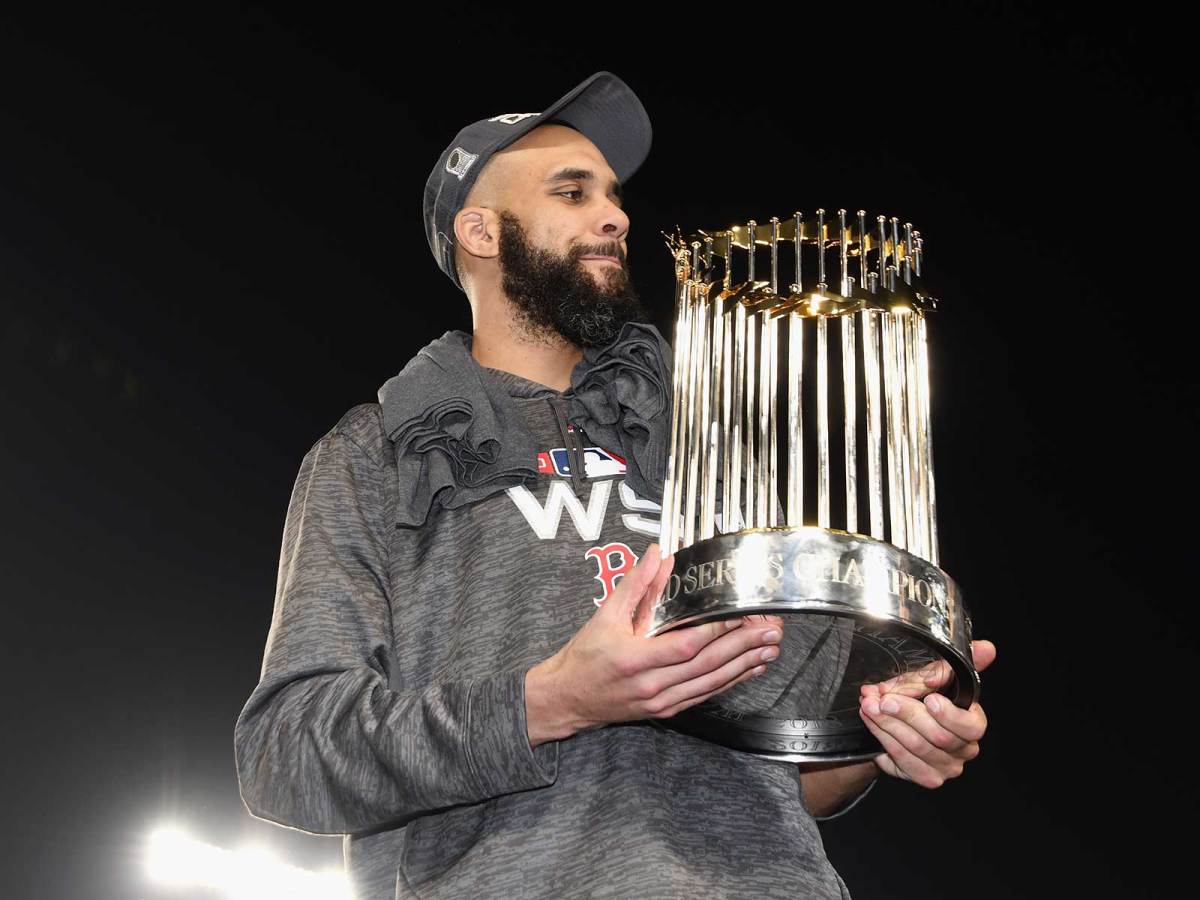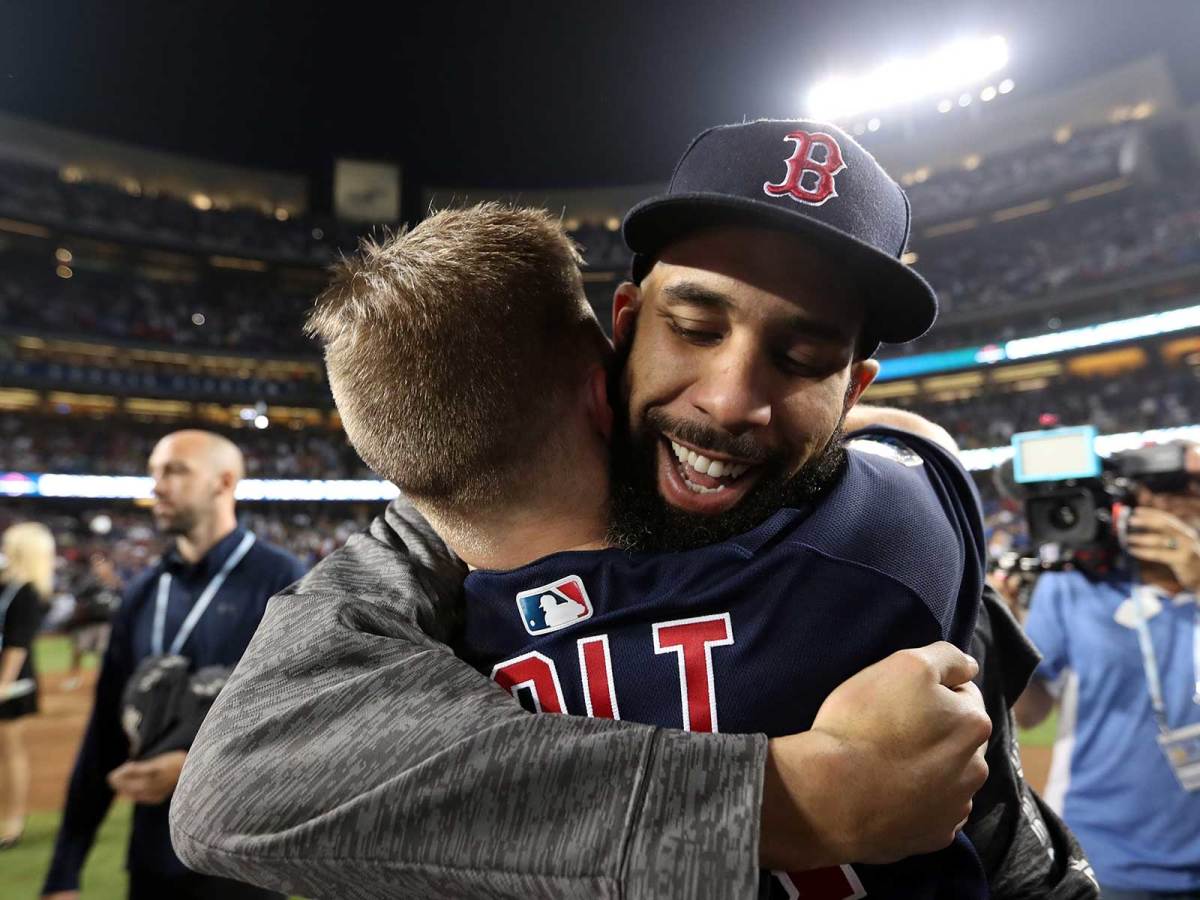From the Reinvented David Price to the Sturdy Steve Pearce, the 2018 Red Sox Are World Champs

LOS ANGELES — On Sunday, for the first time in his life, David Price left a postseason start in the eighth inning to a standing ovation. The fans, some in red and even some in blue, rose in pockets until the majority of the 54,367 at Dodger Stadium were on their feet, applauding the visiting pitcher. It was a sight to see, but the fan in loge box 106, row G, seat 5 missed most of it. She was standing and she was clapping, but the scene was blurry through her tears.
Exactly 30 minutes later, Tiffany Price began sobbing again. It was over. The Red Sox—and her husband—had won Game 5 of the World Series 5–1, and with it the franchise’s ninth title, and its fourth in the past 14 years. The rest of the nation may be used to (and tired of) Boston’s baseball dominance, but the players who captured this championship are not. Only one member of the 25-man roster, 26-year-old shortstop Xander Bogaerts, had won a World Series. Only five others had even played in one.
Those four titles came under three managers and three GMs. Only Bogaerts remains from the 2013 team, and ’07 is so long ago that the only active alumnus of that team is manager Alex Cora. Second baseman Dustin Pedroia would have been the bridge, but a knee injury limited him to three games this season. Everyone from the ’04 team that broke the curse is retired. The only people who have ridden in all three duck boats reside in the front office.
Principal owner John Henry was a partner with the 1998 Yankees, who won 114 games and the Fall Classic, so he knows a bit about dominance.
“The ’98 Yankees didn’t have to beat two 100-win teams before they got to the World Series,” he pointed out.
That actually undersells the journey a bit. The Red Sox steamrolled through the 100-win preseason favorite in their division, the 103-win reigning world champion and the 92-win runner-up from a year ago. This was the best team in the 118-year history of the organization, one of the best teams of all time. This team is its own story.

--
It was May 2016 when Tiffany Price first realized she had underestimated Boston. David had starred for the Rays, where as a rookie reliever in ’08 he had kept the Red Sox out of the World Series, so she thought she had a sense of the vitriol the city could unleash. Then she watched Clay Buchholz—a homegrown former star who had pitched a no-hitter in his second career start and had been an All-Star on the ’13 title team—get lit up at home, and she watched fans react.
“I was like, ‘Are they booing him?’” she said. “I couldn’t believe it.”
General manager Dave Dombrowski arrived in August 2015 from Detroit, and signing Price for seven years and $217 million was his second major move. (First he traded a slew of prospects to the Padres for closer Craig Kimbrel.) A year later, he sent two of the organization’s top five prospects to the White Sox in exchange for ace Chris Sale. But he kept young leftfielder Andrew Benintendi, whom Chicago also wanted.
Dombrowski had to run such a blockbuster by ownership. “Do you want to win a championship now and trade the young players?” he asked them by phone from the Winter Meetings.
“Well, you know, Chris Sale’s a great pitcher, but I think I might want to keep the guys,” said Henry. “But it’s your decision.”
• Make sure to get SI's Red Sox 2018 World Series commemorative package and your championship gear to celebrate.
Dombrowski pulled the trigger. It was a bold move, but perhaps no one in baseball is more willing to make the bold move than Dombrowski. He fired manager John Farrell last year, after he won two straight division titles for the first time in team history, and he told reporters that he would have done it even if Farrell had won the World Series. Then he replaced him with a 42-year-old who had never managed in the big leagues. He gave DH J.D. Martinez a five-year, $110 million deal when no other team was willing to make a similar commitment.
Dombrowski endured ridicule for all his choices. Then, at the trade deadline, he failed to add a reliever to shore up his bullpen, and talk radio seemed even more bewildered. Of all the options out there, Dombrowski traded for aging second baseman Ian Kinsler, fringe starter Nathan Eovaldi and platoon first baseman Steve Pearce?
--
We kept waiting for the mirage to dissipate. Boston opened the season 17–2, but surely it would regress. Then it did—to merely the best team in baseball. The club’s odds of making the playoffs never sank below 100% after June 22. Even in the AL East, where they faced the dangerous Yankees and surprising Rays 19 times each, the Red Sox never lost more than three games in a row. MLB scheduled a season-ending Boston–New York series expecting big drama; instead the Red Sox wrapped up the division a week earlier.
The ALDS, the first playoff meeting between the two teams since 2004, could have provided that theater. Instead it played out like more of a formality. Boston seemed at most risk after Price imploded in Game 2, allowing three runs while recording five outs. Yankees rightfielder Aaron Judge blasted Frank Sinatra’s “New York, New York”—Yankee Stadium’s post-win soundtrack—from a boom box as he strolled through the Fenway Park concourse afterward. At the hitters’ meeting before Game 3, third baseman Eduardo Núñez scolded his teammates for panicking and reminded them to pass the baton, which in his Dominican accent came out as “pass the tongue.” Cora, going with his gut, started second baseman Brock Holt, who was 1-for-15 against that night’s starter, Luis Severino. “Are you sure?” Holt texted Cora. They handed the Yankees their worst playoff loss in franchise history, 16–1. Holt hit for the cycle. In Game 4, with the Red Sox ahead 4–1, Cora used his Game 5 starter, Sale, to get three outs in the eighth inning. “We’re all in,” Cora yelled to the dugout, as his players cheered.
Down a game and two runs in the ALCS, another unlikely hero emerged: centerfielder Jackie Bradley Jr., who had been benched for a week in May as he attempted to retool his swing. He lofted a bases-clearing double for the go-ahead run. Still, Bradley headed to the batting cage before Game 3 searching for his swing. A word from Martinez, the team’s unofficial third hitting coach, clicked him back into place, and Bradley one-upped himself with an eighth-inning, go-ahead grand slam. The next night he launched another one, this time a go-ahead two-run shot, to lock up the ALCS MVP award. In Game 5, Price finally had the playoff start he had imagined, 23 hours after he warmed up in the bullpen as insurance in Game 4. He had adjusted his changeup grip and arm angle, and suddenly the pitch sprang from his hands. He beat his old Tigers teammate, Justin Verlander, who had cultivated a reputation as a playoff stud just as Price was becoming known as a choker.

Then the Red Sox blew through the World Series, even as seemingly every one of their stars struggled. Sale lasted only four innings in Game 1. Likely MVP Mookie Betts, Bogaerts and Martinez combined to hit .206. (Betts went 1-for-Los Angeles; Bogaerts had three hits in the series but made 21 outs in his 22 at bats because he grounded into two double plays.) That platoon first baseman won World Series MVP after he drove in the game-tying and go-ahead runs in Game 4 and hit two home runs in Game 5. That fringe starter threw six innings of dominant relief in Game 3—at 18 innings the longest game in postseason history—and performed so beautifully that the night’s starter—Rick Porcello—wept when it was over.
Perhaps the only mirage was Price’s postseason reputation. He sparkled on Sunday, pitching on three days’ rest from his last start and one day’s rest from his last relief appearance. He baffled hitters with his two-seamer, his four-seamer and that retooled changeup. He allowed a home run on the first pitch he threw, walked the next hitter, then retired 20 of the next 22 men he faced, including 14 straight. When he walked the leadoff man in the eighth with his 89th pitch, Cora came to get him and the fans got to their feet. Price stared straight ahead as he walked into the dugout.
“I thought he would tip his cap,” Bogaerts admitted. “But he didn’t.”
Three seasons and countless ups and downs after he signed with Boston, Price authored the performance of his life. Once Pearce took over on offense, the game’s outcome was in so little doubt that the Red Sox fans in attendance began chanting, “Yankees suck,” in the ninth inning.
“I’m president of the Steve Pearce Fan Club,” said team president Sam Kennedy. “But I thought maybe there’d be two MVPs.”
Tiffany was not the only one who teared up on Sunday. After the trophy presentation, as her husband hoisted Xavier into the air, as the remaining Red Sox fans chanted, “Thank you, David,” as his teammates ran joyfully around the field, Price tossed his cap into into the stands. He began to cry quietly. And for the first time in his life, when he wiped his eyes, he used the hem of his WORLD SERIES CHAMPIONS T-shirt.
